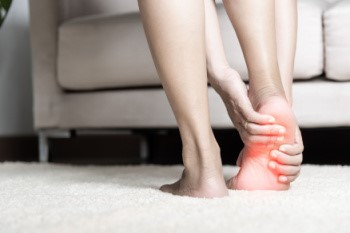 Bursitis in the heel occurs when the bursae in the foot become inflamed. Bursae are small fluid-filled sacs near the joints that cushion the bones and tendons. This inflammation often results from overuse or excessive pressure on the heel, commonly seen in athletes or individuals who engage in frequent running or jumping. Heel bursitis can cause pain in the back of or deep inside the heel, which may worsen with activity and improve with rest. The pain may also be more pronounced in the morning or after long periods of inactivity. Bursitis can also lead to swelling, warmth, and redness in the affected area. Treatment typically involves resting the foot, taking anti-inflammatory medications, and wearing heel pads or orthotic devices to relieve pressure on the heel. Sometimes exercises are also recommended to strengthen the surrounding muscles and tissues. If conservative treatments fail, corticosteroid injections might be considered to reduce inflammation and pain. Taking steps to manage heel bursitis can prevent the condition from recurring and allow you to return to your regular activities without discomfort. If you have painful heels and suspect bursitis, it is suggested you make an appointment with a podiatrist for an evaluation.
Bursitis in the heel occurs when the bursae in the foot become inflamed. Bursae are small fluid-filled sacs near the joints that cushion the bones and tendons. This inflammation often results from overuse or excessive pressure on the heel, commonly seen in athletes or individuals who engage in frequent running or jumping. Heel bursitis can cause pain in the back of or deep inside the heel, which may worsen with activity and improve with rest. The pain may also be more pronounced in the morning or after long periods of inactivity. Bursitis can also lead to swelling, warmth, and redness in the affected area. Treatment typically involves resting the foot, taking anti-inflammatory medications, and wearing heel pads or orthotic devices to relieve pressure on the heel. Sometimes exercises are also recommended to strengthen the surrounding muscles and tissues. If conservative treatments fail, corticosteroid injections might be considered to reduce inflammation and pain. Taking steps to manage heel bursitis can prevent the condition from recurring and allow you to return to your regular activities without discomfort. If you have painful heels and suspect bursitis, it is suggested you make an appointment with a podiatrist for an evaluation.
Many people suffer from bouts of heel pain. For more information, contact one of our clinicians from The Footcare Centre. Our podiatrists can provide the care you need to keep you pain-free and on your feet.
Causes of Heel Pain
Heel pain is often associated with plantar fasciitis. The plantar fascia is a band of tissues that extends along the bottom of the foot. A rip or tear in this ligament can cause inflammation of the tissue.
Achilles tendonitis is another cause of heel pain. Inflammation of the Achilles tendon will cause pain from fractures and muscle tearing. Lack of flexibility is also another symptom.
Heel spurs are another cause of pain. When the tissues of the plantar fascia undergo a great deal of stress, it can lead to ligament separation from the heel bone, causing heel spurs.
Why Might Heel Pain Occur?
- Wearing ill-fitting shoes
- Wearing non-supportive shoes
- Weight change
- Excessive running
Treatments
Heel pain should be treated as soon as possible for immediate results. Keeping your feet in a stress-free environment will help. If you suffer from Achilles tendonitis or plantar fasciitis, applying ice will reduce the swelling. Stretching before an exercise like running will help the muscles. Using all these tips will help make heel pain a condition of the past.
If you have any questions please feel free to contact our offices located in Weybridge, UK. We offer the newest diagnostic and treatment technologies for all your foot and ankle needs.
